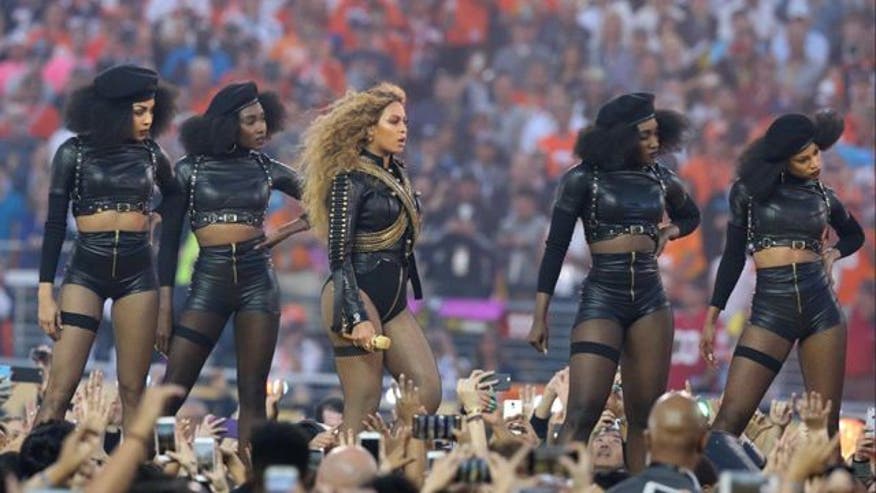Fans were stunned and awestruck when Beyonce released her single, "Formation," last weekend, but the timing made sense. Bey was set to perform alongside Coldplay at the Super Bowl 50, and the song would create a pre-performance buzz.
The single delivered, and that pre-performance buzz worked its way into a widespread media controversy. Viewers were upset about the way Beyonce openly celebrates black culture, particularly in the scene where a young black child stands in front of a group of police officers and the video pans to graffiti on a wall that reads "Stop shooting us." The video is rife with allusions to police killings and Hurricane Katrina.
The controversy heated up when Bey performed "Formation" at the Super Bowl—alongside a group of women dressed as the Black Panthers. Bey wore an outfit that was likely a tribute to Michael Jackson, and the women dressed as Panthers formed an "X" symbol, which many viewers believe was meant to stand for Malcolm X.
New York City mayor Rudy Giuliani called Beyonce's performance "ridiculous" and "anti-police." He went on to say, "What we should be doing in the African-American community, and all communities, is build up respect for police officers. And focus on the fact that when something does go wrong, okay. We'll work on that. But the vast majority of police officers risk their lives to keep us safe."
This isn't surprising at all, considering the backlash that the Black Lives Matter movement often gets from the public: That to stand up for black lives lost to police violence is inherently anti-police.
Bey's performance was not anti-police. It was a call to action. It was a call to justice, and served as a rallying cry for the Black Lives Matter movement. Beyonce used the release of "Formation" to acknowledge that, yes, she has achieved great wealth, fame and success, but she's still aware of her roots, and she's aligning herself with the black community and the current movement.
I have nothing to say about "Formation" as a song. As writer Abby Norman eloquently summed up, as a white person, "Formation" is not for me. I love Beyonce, and I think her songs are often powerful feminist ballads that any woman can belt out. But "Formation" isn't about me, and I think it's important to say that.
I stand with the Black Lives Matter movement and I stand with Beyonce's support. Yes, every situation is individual, but we cannot ignore that racism still runs rampant in the United States, present in every aspect of society. Believing that racism is entirely absent from law enforcement and the criminal justice system is ignorant. Systemic racism is a problem that is embedded in the bones of this country; it's in the very structures that hold privilege in place.
I'm not anti-police or anti-law enforcement in any way. I have family members who have served in various ways to protect our country and I have the utmost respect for the dangerous and necessary job that law enforcement officers perform daily. But Giuliani and so many others miss the point completely when they toss aside what the black community is saying about police violence.
The way dissenters are starting to say, "Not all police officers" sounds an awful lot like the "Not all men" comeback to women's protests against rape culture and sexism. No one said that all police officers are inherently racist and will take any opportunity to shoot a black person. I know I certainly don't believe that. What the Black Lives Matter movement is saying, and what their allies are saying, is this: It may not be all law enforcement officers, but we're not here to argue that, or here to fight the police. We're here to fight against the systemic racism in our society that allows this to happen. We're here to fight against the anti-black rhetoric that spreads like a rash every time another young black person is killed or another black community is deprived of equal rights and access to basic resources.
It's extremely important for a movement like this, which has already faced a lot of public and media backlash, to be supported by someone who is as well-known and respected as Beyonce. After her performance, Bey announced a fund to benefit children in Flint, Michigan following the recent water crisis. This is no accident. Beyonce is taking a stance, and it's an extremely public and crucial one. She's saying: I'm not here for the racism and anti-blackness that's present in every fiber of our country, from our criminal justice system to our politics to our allocation of resources.
Bey's message was bold, and bold is exactly what this country needs right now. The fact that so many people have spoken out against Beyonce, even going as far as to boycott her—including fans who previously supported her—after she released a music video and performed at the Super Bowl in a way that celebrated her blackness, just shows how badly we need it. People cry, "Racism no longer exists!" but then turn on a public figure the moment she dares to say how proud she is to be a black woman.
Those in support of boycotting Beyonce have moved beyond a hashtag campaign (#BoycottBeyonce) and are now planning live meet-ups. The event notice says, "Let's tell the NFL we don't want hate speech & racism at the Superbowl ever again!"
Ironic—considering reverse racism doesn't exist—but not surprising. The reactions to Bey's "Formation" and Super Bowl performance are, if anything, a testament to how deeply embedded racism still is.
As an ally, I won't stand for it. "Formation" may not be about or for me, but that doesn't matter. Black lives matter, and Beyonce's bold and powerful black performances matter.












































